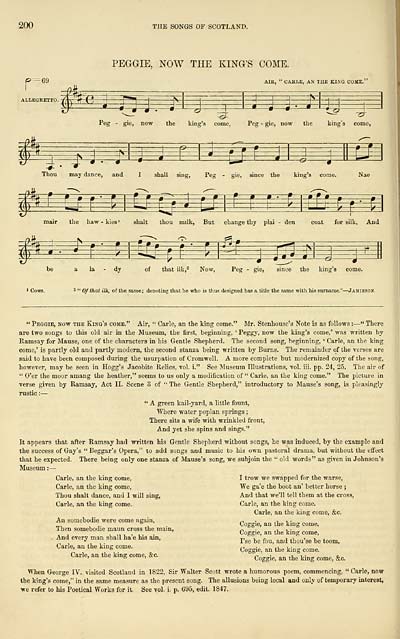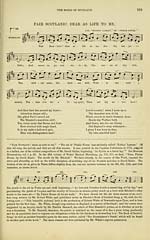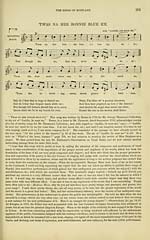Glen Collection of printed music > Printed music > Wood's edition of the songs of Scotland
(226) Page 200 - Peggie, now the king's come
Download files
Complete book:
Individual page:
Thumbnail gallery: Grid view | List view

200
THE SONGS OF SCOTLAND.
P = (
ALLEGRETTO.
P
PEGGIE, NOW THE KING'S COME.
AIK, " CARLE, AN TILE KI-NQ COME."
£
m
s
f 4 4
5
^
« — *
m
^ :
Peg - gie, now the king's come, Peg - gie, now the king's come,
&
1=?
Thou
may dance, and I shall sing, Peg - gie, since the king's come.
Nae
-» — #
=P=»-
mmm
a=t
E3H?3=*
P
±
PE^
?E
g&
*•-
mair the haw - kies ' shalt thou milk, But change thy plai - den coat for silk, And
i-F-
t=i=^^
be a la - dy of that ilk, 2 Now, Peg - gie, since the king's come.
1 Cows. 2 " Of that ilk, of the same; denoting that he who is thus designed has a title the same with his surname." — Jamiesos.
" Peggie, now the King's come." Air, " Carle, an the king come." Mr. Stenhouse's Note is as follows : — " There
are two songs to this old air in the Museum, the first, beginning, ' Peggy, now the king's come,' was written by
Kamsay for Mause, one of the characters in his Gentle Shepherd. The second song, beginning, ' Carle, an the king
come,' is partly old and partly modern, the second stanza being written by Burns. The remainder of the verses are
said to have been composed during the usurpation of Cromwell. A more complete but modernized copy of the song,
however, may be seen in Hogg's Jacobite Relics, vol. i." See Museum Illustrations, vol. iii. pp. 24, 25. The air of
" O'er the moor amang the heather," seems to us only a modification of " Carle, an the king come." The picture in
verse given by Ramsay, Act II. Scene 3 of " The Gentle Shepherd," introductory to Mause's song, is pleasingly
rustic : —
" A green kail-yard, a little fount,
Where water poplan springs ;
There sits a wife with wrinkled front,
And yet she spins and sings."
It appears that after Ramsay had written his Gentle Shepherd without songs, he was induced, by the example and
the success of Gay's " Beggar's Opera," to add songs and music to his own pastoral drama, but without the effect
that he expected. There being only one stanza of Mause's song, we subjoin the " old words" as given in Johnson's
Museum : —
Carle, an the king come, I trow we swapped for the warse,
Carle, an the king come, We ga'e the boot an' better horse ;
Thou shalt dance, and I will sing, And that we'll tell them at the cross,
Carle, an the king come. Carle, an the king come.
Carle, an the king come, &c.
An somebodie were come again, „ . ., , . _
6 . ' . Coggie, an the king come,
Then somebodie maun cross the main, n • n. i • „
,„,,',. . Coggie, an the king come,
- And every man shall ha e his am, T , . „ . ., , • .
■ , ' I se be fou, and thou se be toom,
Carle, an the king come. c ^ an fte ^ CQme
Carle, an the king come, &o. Coggie! an ^ king com6) &0 _
When George IV. visited Scotland in 1822, Sir Walter Scott wrote a humorous poem, commencing, " Carle, now
the king's come," in the same measure as the present song. The allusions being local and only of temporary interest,
we refer to his Poetical Works for it. See vol. i. p. 695, edit. 1847.
THE SONGS OF SCOTLAND.
P = (
ALLEGRETTO.
P
PEGGIE, NOW THE KING'S COME.
AIK, " CARLE, AN TILE KI-NQ COME."
£
m
s
f 4 4
5
^
« — *
m
^ :
Peg - gie, now the king's come, Peg - gie, now the king's come,
&
1=?
Thou
may dance, and I shall sing, Peg - gie, since the king's come.
Nae
-» — #
=P=»-
mmm
a=t
E3H?3=*
P
±
PE^
?E
g&
*•-
mair the haw - kies ' shalt thou milk, But change thy plai - den coat for silk, And
i-F-
t=i=^^
be a la - dy of that ilk, 2 Now, Peg - gie, since the king's come.
1 Cows. 2 " Of that ilk, of the same; denoting that he who is thus designed has a title the same with his surname." — Jamiesos.
" Peggie, now the King's come." Air, " Carle, an the king come." Mr. Stenhouse's Note is as follows : — " There
are two songs to this old air in the Museum, the first, beginning, ' Peggy, now the king's come,' was written by
Kamsay for Mause, one of the characters in his Gentle Shepherd. The second song, beginning, ' Carle, an the king
come,' is partly old and partly modern, the second stanza being written by Burns. The remainder of the verses are
said to have been composed during the usurpation of Cromwell. A more complete but modernized copy of the song,
however, may be seen in Hogg's Jacobite Relics, vol. i." See Museum Illustrations, vol. iii. pp. 24, 25. The air of
" O'er the moor amang the heather," seems to us only a modification of " Carle, an the king come." The picture in
verse given by Ramsay, Act II. Scene 3 of " The Gentle Shepherd," introductory to Mause's song, is pleasingly
rustic : —
" A green kail-yard, a little fount,
Where water poplan springs ;
There sits a wife with wrinkled front,
And yet she spins and sings."
It appears that after Ramsay had written his Gentle Shepherd without songs, he was induced, by the example and
the success of Gay's " Beggar's Opera," to add songs and music to his own pastoral drama, but without the effect
that he expected. There being only one stanza of Mause's song, we subjoin the " old words" as given in Johnson's
Museum : —
Carle, an the king come, I trow we swapped for the warse,
Carle, an the king come, We ga'e the boot an' better horse ;
Thou shalt dance, and I will sing, And that we'll tell them at the cross,
Carle, an the king come. Carle, an the king come.
Carle, an the king come, &c.
An somebodie were come again, „ . ., , . _
6 . ' . Coggie, an the king come,
Then somebodie maun cross the main, n • n. i • „
,„,,',. . Coggie, an the king come,
- And every man shall ha e his am, T , . „ . ., , • .
■ , ' I se be fou, and thou se be toom,
Carle, an the king come. c ^ an fte ^ CQme
Carle, an the king come, &o. Coggie! an ^ king com6) &0 _
When George IV. visited Scotland in 1822, Sir Walter Scott wrote a humorous poem, commencing, " Carle, now
the king's come," in the same measure as the present song. The allusions being local and only of temporary interest,
we refer to his Poetical Works for it. See vol. i. p. 695, edit. 1847.
Set display mode to: Large image | Transcription
Images and transcriptions on this page, including medium image downloads, may be used under the Creative Commons Attribution 4.0 International Licence unless otherwise stated. ![]()
| Special collections of printed music > Glen Collection of printed music > Printed music > Wood's edition of the songs of Scotland > (226) Page 200 - Peggie, now the king's come |
|---|
| Permanent URL | https://digital.nls.uk/91340455 |
|---|
| Description | Scottish songs and music of the 18th and early 19th centuries, including music for the Highland bagpipe. These are selected items from the collection of John Glen (1833 to 1904). Also includes a few manuscripts, some treatises, and other books on the subject. |
|---|
| Description | The Glen Collection and the Inglis Collection represent mainly 18th and 19th century Scottish music, including Scottish songs. The collections of Berlioz and Verdi collected by bibliographer Cecil Hopkinson contain contemporary and later editions of the works of the two composers Berlioz and Verdi. |
|---|

